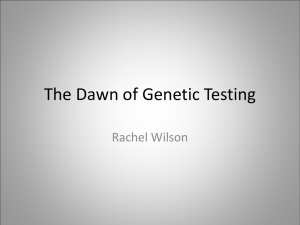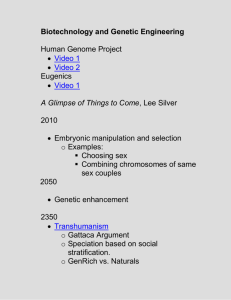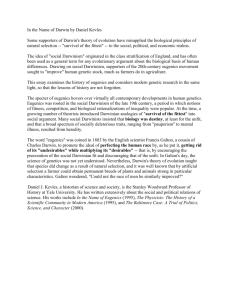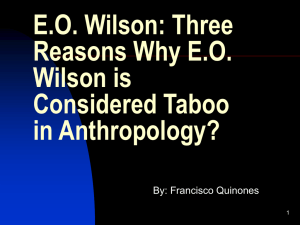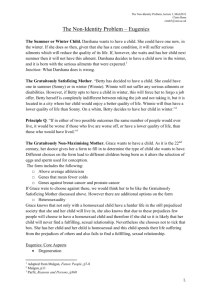Genetically Designing Babies Is Unethical Michael Sandel
advertisement
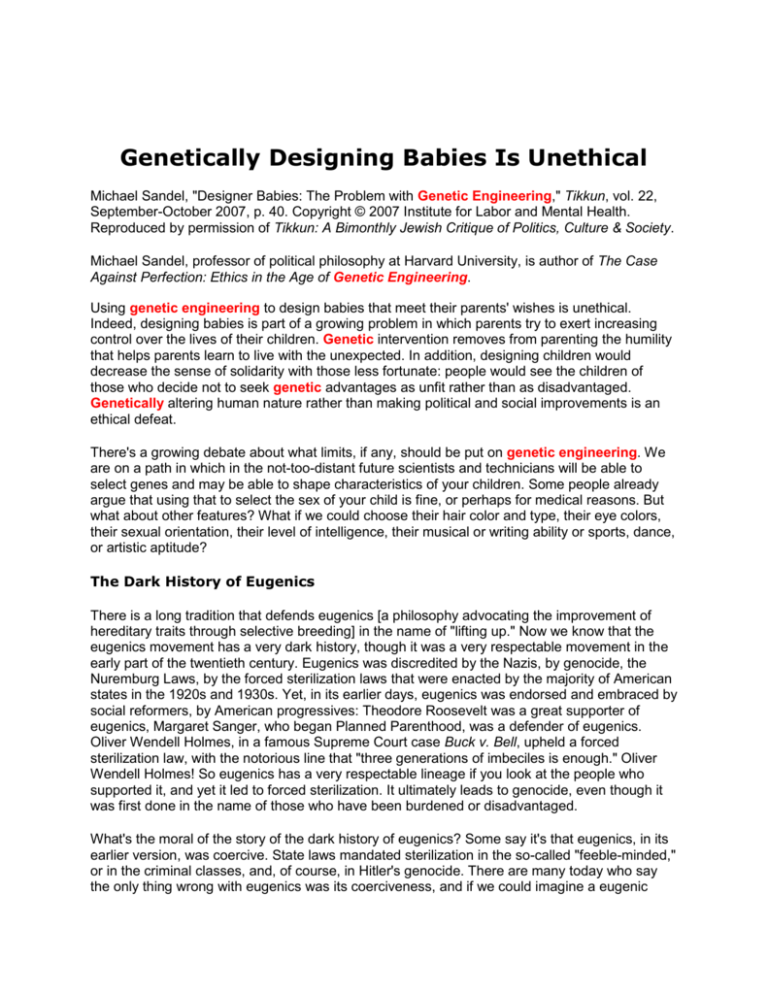
Genetically Designing Babies Is Unethical Michael Sandel, "Designer Babies: The Problem with Genetic Engineering," Tikkun, vol. 22, September-October 2007, p. 40. Copyright © 2007 Institute for Labor and Mental Health. Reproduced by permission of Tikkun: A Bimonthly Jewish Critique of Politics, Culture & Society. Michael Sandel, professor of political philosophy at Harvard University, is author of The Case Against Perfection: Ethics in the Age of Genetic Engineering. Using genetic engineering to design babies that meet their parents' wishes is unethical. Indeed, designing babies is part of a growing problem in which parents try to exert increasing control over the lives of their children. Genetic intervention removes from parenting the humility that helps parents learn to live with the unexpected. In addition, designing children would decrease the sense of solidarity with those less fortunate: people would see the children of those who decide not to seek genetic advantages as unfit rather than as disadvantaged. Genetically altering human nature rather than making political and social improvements is an ethical defeat. There's a growing debate about what limits, if any, should be put on genetic engineering. We are on a path in which in the not-too-distant future scientists and technicians will be able to select genes and may be able to shape characteristics of your children. Some people already argue that using that to select the sex of your child is fine, or perhaps for medical reasons. But what about other features? What if we could choose their hair color and type, their eye colors, their sexual orientation, their level of intelligence, their musical or writing ability or sports, dance, or artistic aptitude? The Dark History of Eugenics There is a long tradition that defends eugenics [a philosophy advocating the improvement of hereditary traits through selective breeding] in the name of "lifting up." Now we know that the eugenics movement has a very dark history, though it was a very respectable movement in the early part of the twentieth century. Eugenics was discredited by the Nazis, by genocide, the Nuremburg Laws, by the forced sterilization laws that were enacted by the majority of American states in the 1920s and 1930s. Yet, in its earlier days, eugenics was endorsed and embraced by social reformers, by American progressives: Theodore Roosevelt was a great supporter of eugenics, Margaret Sanger, who began Planned Parenthood, was a defender of eugenics. Oliver Wendell Holmes, in a famous Supreme Court case Buck v. Bell, upheld a forced sterilization law, with the notorious line that "three generations of imbeciles is enough." Oliver Wendell Holmes! So eugenics has a very respectable lineage if you look at the people who supported it, and yet it led to forced sterilization. It ultimately leads to genocide, even though it was first done in the name of those who have been burdened or disadvantaged. What's the moral of the story of the dark history of eugenics? Some say it's that eugenics, in its earlier version, was coercive. State laws mandated sterilization in the so-called "feeble-minded," or in the criminal classes, and, of course, in Hitler's genocide. There are many today who say the only thing wrong with eugenics was its coerciveness, and if we could imagine a eugenic program that was not mandated by the State, that was not coercive, but was chosen by the individual parents trying to help and lift up their children, then there's nothing wrong with eugenics. But I think that's a mistake. I think that coercion was not the only thing wrong with eugenics. What we have today with designer children is privatized eugenics, free market eugenics, individualistic eugenics. Without the broad social ambitions for everyone, it's really now an instrument for privileged parents to give their kids a competitive edge. Privatized eugenics reflect a deflation of the ideal of eugenics, perverse as that ideal was in its enactment, because it's no longer trying to uplift humanity, or entire societies, but just trying to get a competitive edge. I think what's wrong with eugenics, beyond coercion, is the fact of its ambition to try to control or exercise dominion over the genetic traits of the next generation. That's morally troubling, whether done on a society-wide basis or done by individual parents trying to give their kids a competitive edge. Of course, there are objections about whether doing this can be made safe and predictable. And there is another question about making it available in a fair way, so that it would not only be an option for rich people. But what would be your objection if the designer child were an equal option for all, publicly subsidized as part of a universal health care system, and it could be done in a way that was safe and predictable? The drive to create children of a certain character reflects an aspiration ... to exercise our human will and our ability to remake human nature to serve our purposes and satisfy our desires. Creating Children to Satisfy Our Desires Is there a moral objection to this genetic engineering, beyond safety, beyond fairness? After all, we tend to praise parents who give their children every advantage they can: offer them music lessons to learn an instrument, play catch with them to learn how to be coordinated in sports, help them do their homework so that they can more fully learn what they need to learn. So what's the objection to parents wanting to give their children the advantage of genes that make it easier for them to succeed in creating a pleasant life for themselves? It seems to me that there is a reason for a set of moral considerations that go beyond safety and fairness. What makes us most uneasy about the use of genetic engineering to enhance or to create something, has to do with the fact that the drive to create children of a certain character reflects an aspiration to freedom, mastery, and control, and to exercise our human will and our ability to remake human nature to serve our purposes and satisfy our desires. It seems to me there is something flawed but deeply attractive about that. To appreciate children as gifts is to accept them as they come, not as products of our design or instruments of our ambition. This uneasiness, I believe, connects to a recognition that there is a way in which who we are is a gift from the universe. And this is to say that not everything we are is a product of our own doing, and not everything in the world is open to any use we might desire or devise. An appreciation of the giftedness of life might induce in us a certain humility. What I'm trying to articulate here is, in part, a religious sensibility, but its resonance reaches beyond religion. Let's go back to the example of designer children. It's very hard to make sense of what's precious or special about the relationship between parents and children without drawing, at least a little, on the ethic of giftedness. To appreciate children as gifts is to accept them as they come, not as products of our design or instruments of our ambition. Parental love is not contingent, or at least it shouldn't be contingent, on attributes that the child happens to have. We choose our friends and our spouses at least partly on qualities that we find attractive, but we do not choose our children—that's an important moral fact about parenting. Even the most conscientious parent cannot be held wholly responsible for the child that they had. This is why parenting teaches us what the theologian William May calls "an openness to the unbidden." The Hubris of Designing Children The problem of genetic engineering lies in the hubris of the designing parents. Even if this disposition doesn't make parents tyrants to their children, still it disfigures the relation between parent and child and it deprives the parent of the humility, the human sympathies, and the openness to the unbidden. Now, to appreciate children as gifts and blessings from God is not to be passive in the face of illness. It's true that medical treatment intervenes with nature, but it does so for the sake of health. It doesn't represent the same bid for mastery. Even strenuous medicine, to treat or cure diseases, doesn't constitute a Promethean assault. Medicine is at least governed by a certain norm, the norm of preserving and restoring, and that is what constitutes good health. What counts as "good health" is open to argument. There is research about whether deafness or other disabilities should be cured, or if they should be part of an identity that is cherished. But even then, the disagreement comes from the assumption that the purpose of medicine is to promote health and cure disease. Now there is a complexity with this idea of resisting the temptation to manage, direct, and protect our children. Because we do that as parents. Parents want to educate their children, give them every opportunity, help them learn an instrument, develop athletic skill.... What then is the difference, and this is not an easy question to answer, but what is the difference between providing help with health and training, and providing this help with the use of genetic enhancement? Parents spend all this money educating their children and giving them special advantages. If that's accurate, why isn't it equally as admirable for parents to use whatever genetic technology has been developed, provided it's safe, to enhance their children's chance at life, to give them a competitive edge? The problem of genetic engineering lies in the hubris of the designing parents. The Problem of Hyperparenting The answer I would give to this question is that the defenders of genetic engineering are right to say that there is not such a bright line between the use of genetic technology to enhance children, and the kind of heavily managed, high-pressure child rearing practices that are common these days. But this similarity, this parallel, does not vindicate genetic enhancement. To the contrary, it highlights a problem with the high-pressure hyper-parenting tendencies that we see in our society today. We see the frenzy of parents at soccer game sidelines or at Little League. It is a frenzy, or an anxiety even, of the parents to manage, to hold, to direct their children's lives. I don't think there is such a clear line between these two practices, but this suggests that the overreaching in genetic parenting may actually shed light on the kind of overreaching frenzied parenting that we see now. So, let me say a word about the larger moral stance if the account I have given is right. Some people would say of this drive for mastery and life control: "That's parents exercising their freedom to give their kids the best, and who are we to criticize that freedom?" What would happen if biotechnology dissolved our sense of giftedness? There are two answers to this question. One of them is the religious answer (which suggests that using biotechnology has us assume a role in creation that seeks to make us on par with God). Biotechnology is, in a sense, "playing God." The moral stakes can also be understood in secular terms. One way of seeing this is to consider what would be the effect on our moral landscape if the practice of designer parents became the common way of parenting? At least two key features of our moral culture would be transformed. One of them is humility and the other is solidarity. Parents should be able to choose what they want to do, but they shouldn't be free to choose the burden of choice that this new technology creates. Living with the Unexpected Let me say a word about humility and why it matters as a social ethic. Parenthood is a school for humility. We care deeply about our children but cannot choose the kind we want. Humility teaches us to reign in our need for control and to live with the unexpected. One of the blessings of seeing ourselves as creatures of nature or God is that we are not always responsible for the way we are. The more we become masters of our genetics the greater burden we bear for the talents we have and the way we perform. So with the erosion of humility comes an explosion of responsibility. Consider the use of genetic testing. In the past, giving birth to a child with Down syndrome was a matter of chance. Today, parents of children with Down syndrome are judged or blamed. Because people will say to them "why did you bring this child into the world?" So the responsibility is greater because we have a choice. Parents should be able to choose what they want to do, but they shouldn't be free to choose the burden of choice that this new technology creates. Rather than increase our genetic powers to fit ourselves into society, we should ... create political and social realms that are more hospitable ... to the limitations of imperfect human beings. A Diminished Sense of Solidarity Along with the explosion of responsibility over our own fate and that of our children, comes, paradoxically, a diminished sense of solidarity with those less fortunate than ourselves. Here's why: the more open we are to chance in the control over our own success, the more reason we have to share our fate with others. Why, after all, do the successful owe anything to the least advantaged members of society? The answers to these questions lie very heavily in the notions of giftedness. They lean on the idea that our success has nothing to do with hard work, or other things within our control, but on good fortune—the result of the genetic lottery. If we regard our genetics as gifts rather than achievements for which we can claim credit, then we have no basis to claim that we are entitled to the good things in society. A lively sense of the contingency of our gifts can be used in a "meritocratic" society like ours to prevent us from sliding into the idea that the rich are rich because they are more deserving than the poor. If genetic engineering enabled us to override the results of the genetic lottery, if it enabled us to replace chance with choice, it's likely that the gifted character of human powers and achievements would recede, and with it, perhaps, our capacity to see ourselves as sharing a common fate. The successful would be even more likely than they are now to see themselves as self-made and self-sufficient, and those at the bottom of society would be seen not as disadvantaged, but simply as unfit. The meritocracy would become less forgiving. So that's why humility and solidarity as features of our moral culture can help us preserve a lively sense of giftedness of our nature, of our talents, and of our achievements.... So, to go back to the question with which I began, beyond safety and beyond fairness, what is the source of our unease about designer children? I think it has something to do with our big questions about human nature and the limits of the Promethean project of mastery and control. It is tempting to think that bioengineering our children and selves is an exercise in freedom, but it really isn't. Because changing our nature to fit the world rather than the other way around is actually an ethical defeat. It distracts us from reflecting critically on the world. It deadens the impulse for social and political improvement. So rather than increase our genetic powers to fit ourselves into society, we should do what we can to create political and social realms that are more hospitable to the gifts and also to the limitations of imperfect human beings.

